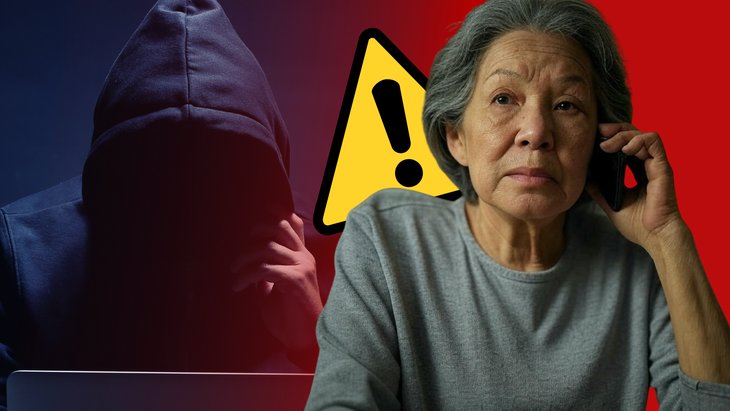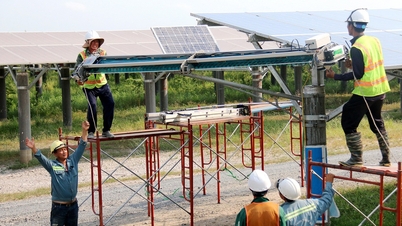Story: Not new, but not old!
Last May, Ms. P., 68 years old, in Hanoi , received a call from a person claiming to be a police officer, informing her that she was involved in a money laundering ring. The news was true, she transferred a total of 15 billion VND in 32 transactions as requested by the subject. Similarly, a 19-year-old female student in Hanoi was also scammed of nearly 3 billion VND after a call from a person pretending to be an investigator, with her full name, address and ID number.
Cases like Ms. P. and the female student are not rare. In the first 6 months of 2025 alone, according to statistics from the Ministry of Public Security , more than 4,800 phone scams were recorded , causing hundreds of billions of dong in damage. Meanwhile, scams are increasingly changing, using high technology such as deepfake, AI voice imitation and impersonating international numbers.
Common forms of scam calls today

Warning of phone scams - Photo: ILLUSTRATION
Despite constant warnings, scam calls continue to appear with many different scenarios — more sophisticated, more methodical, and especially targeting the victim's confusion, fear, or trust.
One of the most familiar tricks is impersonating government agencies. . The subjects often call claiming to be police, court, or even prosecutor, informing the listener that they are being investigated for being involved in a certain case. While the victim is still confused, they ask for their ID number, bank account, or even money transfer to "verify information".
Many people have also received calls from fake bank employees , warning of unusual transactions in their accounts. After a few words of “support”, the subject will ask for an OTP code, card number, or download a “checking” application – which is actually software that steals personal data.
Another trick is to impersonate an acquaintance . In many cases, the subject hacks the victim's Facebook or Zalo account and then uses that account to text or call relatives, claiming that they are short of money or have had an accident and need to transfer money urgently.
Some scammers take a more subtle approach, spoofing a promotion or sweepstakes call center . They claim the caller has won a motorbike, phone, or gift certificate, but must pay a “shipping fee” or provide personal information to receive the gift.
Although the scenario may change over time, the common point of these calls is that they are all aimed at stealing personal information and appropriating property. It is important for the listener to stay alert and not be drawn into the bad guy's pre-existing scenario.
Signs of a scam call
Be cautious when receiving calls from unknown numbers, especially international numbers or numbers with unknown identities. Callers often use a robotic voice or introduce themselves along with your personal information to gain your trust.
The call content is threatening and pressuring to make you panic. They ask you to provide sensitive information such as:
- OTP code or bank account information;
- Request to transfer money to “handle the matter”;
- Instructions for installing strange applications, opening links or scanning QR codes may cause information security loss.
Always be alert and double check before acting on any requests from these calls.
What should you do when you receive a suspicious call?
First of all, people should absolutely not provide personal information , bank account numbers or OTP codes to anyone over the phone, even if the other party claims to be a government agency or bank employee.
If you have any doubts about the content of the call, hang up immediately , without arguing or continuing the conversation. Afterwards, you should check the incoming phone number by looking it up on the Internet or calling the official switchboard of the mentioned unit for verification.
If detecting signs of fraud, people can report the call to the network operator or send feedback to the Department of Information Security ( Ministry of Information and Communications ).
In case you have accidentally transferred money to a scammer, you need to immediately report to the police and relevant banks for timely support and to limit damage.
How to prevent early
To limit risks, users should proactively apply the following measures:
- Enable spam/scam call blocking on smartphones: Android can enable “Caller ID & Spam”; iPhone uses “Silence Unknown Callers” or an app like Truecaller.
- Register not to receive spam calls at the official website of the Ministry of Information and Communications: khongquangcao.ais.gov.vn
- Share the warning with elderly relatives – the group most vulnerable to fraud today.
- Do not click on strange links, do not install applications from unknown sources.
Phone scams are becoming more sophisticated, but by being vigilant and educated, everyone can protect themselves. Always be cautious, do not share personal information and report any unusual signs immediately to minimize the risk.
Source: https://tuoitre.vn/nhan-dien-cac-cuoc-goi-lua-dao-dau-hieu-va-cach-phong-tranh-20250527105109399.htm



![[Photo] National Assembly Chairman Tran Thanh Man holds talks with Speaker of the Malaysian House of Representatives](https://vphoto.vietnam.vn/thumb/1200x675/vietnam/resource/IMAGE/2025/9/19/5cb954e3276c4c1587968acb4999262e)

![[Photo] Spreading Vietnamese culture to Russian children](https://vphoto.vietnam.vn/thumb/1200x675/vietnam/resource/IMAGE/2025/9/19/0c3a3a23fc544b9c9b67f4e243f1e165)
![[Photo] Secret Garden will appear in Nhan Dan Newspaper's Good Morning Vietnam 2025 project](https://vphoto.vietnam.vn/thumb/1200x675/vietnam/resource/IMAGE/2025/9/19/cec307f0cfdd4836b1b36954efe35a79)
![[Photo] Sea turtle midwives](https://vphoto.vietnam.vn/thumb/1200x675/vietnam/resource/IMAGE/2025/9/19/9547200fdcea40bca323e59652c1d07e)






















































































Comment (0)